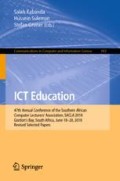Abstract
Bayesian Networks and Machine Learning techniques were evaluated and compared for predicting academic performance of Computer Science students at the University of Cape Town. Bayesian Networks performed similarly to other classification models. The causal links inherent in Bayesian Networks allow for understanding of the contributing factors for academic success in this field. The most effective indicators of success in first-year ‘core’ courses in Computer Science included the student’s scores for Mathematics and Physics as well as their aptitude for learning and their work ethos. It was found that unsuccessful students could be identified with \(\approx \)91% accuracy. This could help to increase throughput as well as student wellbeing at university.
Access this chapter
Tax calculation will be finalised at checkout
Purchases are for personal use only
Notes
- 1.
- 2.
In South Africa, ‘Matric’ is name of the formal qualification level of pupils who have passed their secondary school (high school) education after school-year 12 before university—somewhat similar to the Austrian ‘Matura’ or the German ‘Abitur’.
- 3.
References
Andrade, M.S.: International students in English-speaking universities: adjustment factors. J. Res. Int. Educ. 5(2), 131–154 (2006)
Asif, R., Merceron, A., Ali, S.A., Haider, N.G.: Analyzing undergraduate students’ performance using educational data mining. Comput. Educ. 113, 177–194 (2017)
Baker, R.S.: Data mining for education. Int. Encycl. Educ. 7(3), 112–118 (2010)
Baker, R.S., Yacef, K.: The state of educational data mining in 2009: a review and future visions. J. Educ. Data Min. 1(1), 3–17 (2009)
Boughorbel, S., Jarray, F., El-Anbari, M.: Optimal classifier for imbalanced data using Matthews Correlation Coefficient metric. PloS One 12(6), 1–17 (2017)
Breiman, L.: Random forests. Mach. Learn. 45(1), 5–32 (2001)
Friedman, J., Hastie, T., Tibshirani, R.: The Elements of Statistical Learning. SSS. Springer, New York (2001). https://doi.org/10.1007/978-0-387-21606-5
Gupta, A., Mehrotra, K.G., Mohan, C.: A clustering-based discretization for supervised learning. Stat. Probab. Lett. 80(9), 816–824 (2010)
Hall, M., Eibe, F., Holmes, G., Pfahringer, B., Reutemann, P., Witten, I.H.: The WEKA data mining software: an update. ACM SIGKDD Explor. 11(1), 10–18 (2009)
Heaton, J.: Bayesian networks for predictive modeling. Forecast. Futur. 7, 6–10 (2013)
Korb, K.B., Nicholson, A.E.: Bayesian Artificial Intelligence, 2nd edn. CRC Press, Boca Raton (2010)
Mashiloane, L.: Educational data mining (EDM) in a South African University: a longitudinal study of factors that affect the academic performance of computer science 1 students. Doctoral Dissertations, University of the Witwatersrand (2016)
Nghe, N.T., Janecek, P., Haddawy, P.: A comparative analysis of techniques for predicting academic performance. In: Proceedings of the 37th Annual IEEE Frontiers in Education Conference, FIE 2007 (2007)
Osmanbegović, E., Suljić, M.: Data mining approach for predicting student performance. Econ. Rev. 10(1), 3–12 (2012)
Quinlan, J.R.: C4.5: Programs for Machine Learning. Elsevier, Amsterdam (2014)
Romero, C., Ventura, S.: Educational data mining: a review of the state of the art. IEEE Trans. Syst. Man Cybern. Part C (Appl. Rev.) 40(6), 601–618 (2010)
Shahiri, A.M., Husain, W., Abdul, R.: A review on predicting students’ performance using data mining techniques. Procedia Comput. Sci. 72, 414–422 (2015)
Spaull, N.: South Africa’s education crisis: the quality of education in South Africa 1994–2011. Technical report, Centre for Development and Enterprise, Johannesburg (2013)
University of Cape Town: Faculty of Science Handbook (2017). http://www.students.uct.ac.za/usr/apply/handbooks/2017/SCI_2017.pdf
Xing, W., Guo, R., Petakovic, E., Goggins, S.: Participation-based student final performance prediction model through interpretable genetic programming: integrating learning analytics, educational data mining and theory. Comput. Hum. Behav. 47, 168–181 (2015)
Author information
Authors and Affiliations
Corresponding author
Editor information
Editors and Affiliations
Rights and permissions
Copyright information
© 2019 Springer Nature Switzerland AG
About this paper
Cite this paper
Nudelman, Z., Moodley, D., Berman, S. (2019). Using Bayesian Networks and Machine Learning to Predict Computer Science Success. In: Kabanda, S., Suleman, H., Gruner, S. (eds) ICT Education. SACLA 2018. Communications in Computer and Information Science, vol 963. Springer, Cham. https://doi.org/10.1007/978-3-030-05813-5_14
Download citation
DOI: https://doi.org/10.1007/978-3-030-05813-5_14
Published:
Publisher Name: Springer, Cham
Print ISBN: 978-3-030-05812-8
Online ISBN: 978-3-030-05813-5
eBook Packages: Computer ScienceComputer Science (R0)

